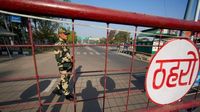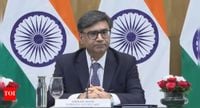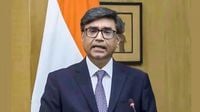In a robust diplomatic move following the recent escalation of tensions with Pakistan, India is intensifying its efforts to hold Islamabad accountable for its alleged support of terrorism. As part of this initiative, India has called for global pressure on Pakistan and the terrorist organization The Resistance Front (TRF), urging for international sanctions amidst the backdrop of Operation Sindoor, which was launched in response to the deadly Pahalgam attack.
On May 8, 2025, Indian officials, led by Foreign Secretary Vikram Misri, reiterated the need for the United States to formally designate TRF as a Foreign Terrorist Organization. Misri highlighted the group's direct involvement in the Pahalgam attack, where 26 civilians lost their lives. He pointed out that figures like Hafiz Abdul Rauf have openly incited jihad for 2025, further emphasizing the urgent need for action.
India has also reached out to the United Nations Security Council, urging it to recognize TRF as a global terror entity. Misri stated, "Pakistan has opposed the mention of the terror organization TRF in the UN Security Council statement regarding the Pahalgam attack, even after the group claimed responsibility for it twice." This refusal to acknowledge TRF's role, he argued, exposes Pakistan's ongoing support for terrorism.
In the wake of securing a trade deal with the UK, Indian representatives are pressing the British government to ban TRF and impose financial sanctions on Pakistan through the UK Treasury. Concurrently, as discussions for a new US trade deal are underway, Indian officials are advocating that Pakistan's ties to terror groups be factored into bilateral agreements.
Domestically, the Indian government is urged to support Kashmiris, particularly those affected by shelling in Poonch and Uri. There is a growing sentiment that families of victims should be recognized as terrorism victims and compensated under security-related expenditure schemes, which include the reconstruction of damaged homes.
As part of its diplomatic strategy, India is emphasizing the military significance of its strikes on terror hubs in Muridke and Bahawalpur, which are known strongholds of anti-India terrorism. Misri noted, "Pakistan's reputation as the epicenter of global terrorism is rooted in numerous terrorist attacks across the globe," urging international allies to recognize this reality.
India's leadership is also focusing on uniting the nation in the face of adversity. The emotional aftermath of the Pahalgam attack, which included the martyrdom of soldiers like Lance Naik Dinesh Kumar Sharma, has prompted calls for a collective response to both military and media narratives. The government has been reminded to respond with strength and sensitivity, especially in light of the tragic loss of life.
In a joint briefing by the Ministry of External Affairs (MEA) and security forces, it was confirmed that the Pahalgam attack marked a significant escalation in hostilities, with Misri stating, "The attack in Pahalgam was the original escalation, and the Indian Armed Forces only replied to that escalation on May 7." Colonel Sofiya Qureshi added that Pakistan targeted several military sites in North and Western India on the night of May 7 and 8, including locations like Awantipora and Jammu.
Political unity has emerged in India following these events. An all-party meeting chaired by Defence Minister Rajnath Singh brought together leaders from various political factions to discuss the objectives and outcomes of Operation Sindoor. AIMIM chief Asaduddin Owaisi praised the armed forces for their decisive actions and called for the declaration of those killed in Poonch as terrorism victims.
Owaisi expressed concern over international media reports regarding a Rafale jet crash in Bathinda, urging the Indian Air Force to clarify the situation to maintain morale. He also advocated for a global campaign to designate TRF as a terrorist organization and to push for Pakistan's re-listing on the FATF grey list.
Leader of Opposition in Rajya Sabha, Mallikarjun Kharge, reiterated the Congress party's full support for the government and armed forces, emphasizing the need for unity in the fight against terrorism. Union Parliamentary Affairs Minister Kiren Rijiju highlighted the bipartisan consensus, stating that all leaders appreciated the bravery of the armed forces and reaffirmed their support for the government.
As the situation continues to evolve, India is acutely aware of the dual-front threat posed by both Pakistan and China. Indian officials have signaled that China must ensure Pakistan hands over terrorists wanted by India who are sheltering on its soil.
Meanwhile, Pakistan has faced backlash for its narrative surrounding civilian casualties. Foreign Secretary Misri pointed out the absurdity of Pakistan conducting state funerals for individuals identified as terrorists by Indian intelligence, stating, "It is odd that funerals of civilians are being carried out by coffins wrapped in their national flag... and state honours are being awarded." This remark underscores India's stance that Pakistan continues to shield and honor terrorists.
With tensions running high, the Indian government remains steadfast in its commitment to address the threats posed by terrorism while seeking international support. The diplomatic offensive against Pakistan and TRF is seen as a crucial step in reinforcing India's security and counter-terrorism efforts.
As the nation mourns the victims of the Pahalgam attack and confronts the implications of Pakistan's actions, the call for unity and decisive action resonates across the political spectrum. India's leadership is determined to respond effectively to both military provocations and misinformation in the media, ensuring that the sacrifices of its soldiers are honored and that the fight against terrorism continues unabated.






